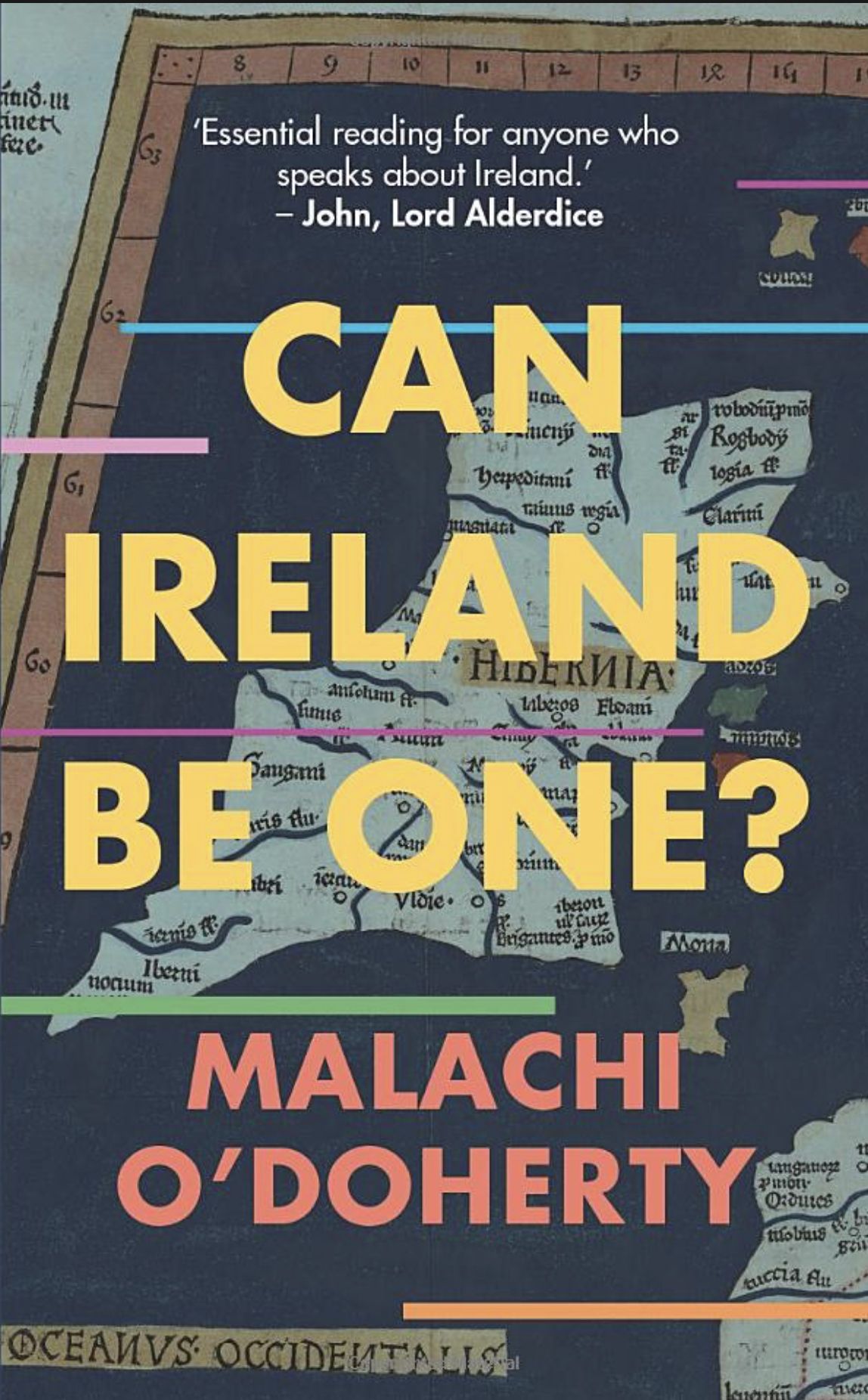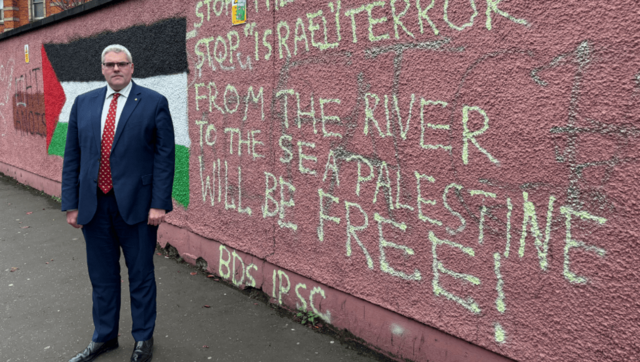ANYONE expecting an answer to the question ‘Can Ireland Be One?’ by the end of Malachi O’Doherty’s new book of the same title is destined for disappointment. This is no audit of the economic pros and cons of ending partition and nor is it an analysis of the sometimes shiny and sometimes grubby new realities that have rocketed the question of unity to the top of the political agenda. Indeed, Brexit and the Protocol – the two issues which have moved the ground and redefined the terms of the unity debate in a six-year blink of the eye – to all intents and purposes never happened, so seldom are they referred to and so lightly are they passed over.
What we have instead is a largely personal series of discursions in which Malachi addresses not those real-world developments which are so rapidly and utterly changing the island’s political landscape, but themes and subjects that will be familiar to those acquainted with his broadcast and print output: a Riverdale Catholic loses his religion and ponders gravely, regretfully and seldom hopefully the age-old question of why we don’t get along.
The relegation of the Protocol from leading role to bit part in what could well prove to be the final act of the partition drama would be surprising enough, but there’s also a curious reliance on people writing and working in a time before ATMs and colour television, never mind mobile phones and the internet. Hubert Butler’s 1954 work ‘Portrait of a Minority’, for instance; professional nice bloke Sam McAughtry, who was telling stories on the wireless when Squinter was learning to drink in the Hunting Lodge; Nancy Scheper-Hughes’ 1970s book ‘Saints, Scholars and Schizophrenics’. If there are nuggets of contemporary relevance in these blasts from our grey past, Squinter failed to find them.
Malachi’s best and most engaging writing comes in describing for us the rich foliage of his spreading family tree. He’s obviously fascinated and entertained by the contradictions and anomalies thrown up not just by his forebears’ cross-border mobility – as are we – but also by the historical heft of names maiden and married.
Last time I was at the top of Errigal I didn’t see anyone wearing a Peaky Blinders cap and Richard Harris’s string-tied overcoat from The Field. On a bitter day in Belfast it’s North Face and Goretex every bit as much as it is in Berne and Vienna.
But throwaway lines which may raise a smile or an eyebrow in lands far away too often jar. “We call this climate temperate or moderate. It is, in fact, bi-polar. But we are so little adjusted to reality that season swings actually surprise us. A coming storm will make headline news and we will be little prepared for it, as if we have never seen the like of it before. We don’t learn.” Just us? Some time, Malachi, you should try watching a television weather report from London or New York. “We are different from the Swiss or the Austrians,” he tells us. “They know what weather to expect. They know what clothes to wear for the cold: fully zippered puff jackets. We don’t.
We still put our faith in wool.” Sorrypardonwhat? Last time I was at the top of Errigal
I didn’t see anyone wearing a Peaky Blinders cap and Richard Harris’s string-tied overcoat from The Field. On a bitter day in Belfast it’s North Face and Goretex every bit as much as it is in Berne and Vienna. And while the Donegal of his grandparents may have been the part of Ireland that’s “closest to the Arctic Circle,” polar bears were not known to roam the sea ice of Sheephaven Bay. Not even bi-polar bears.
In a book with a question mark in the title, other authorial questions are inevitably asked – and they are nearly always carefully and strategically rhetorical.
“Do we still have an indigenous Irish culture that must be preserved? Have we ever had one?”
“We ask if Ireland can be one. Can any country be one?”
“...support for a united Ireland at a little over 30 per cent suggests that the middle-grounders that Neale Richmond needs are not really interested. So is the whole discussion a waste of breath?”
Writing a chapter on ‘Culture’ that’s 13 pages long was always going to be a severe test of Malachi’s reductive powers, and he gets an A+ for innovation. It opens with three pages on the time the author heard ‘Kevin Barry’ being played on Lyric FM and called up the station to see if anybody complained (nobody had, although Malachi doesn’t say if he was outraged or relieved), and ends with ten pages about the Orange Order. Comparing the Twelfth with the Pride carnival he writes: “Both are hugely entertaining experiences for those who don’t take offence.” A bold sentence, although Squinter would gently point out that taking offence at the LGBTQ+ community and taking offence at the male-only, anti-Catholic Orange Order are rather different things. And hugely entertaining? Not from the heaving pavement drunkfest at Shaftesbury Square it isn’t, even for non-offence-takers.
No ambiguity, no ifs or buts or mights or mays, on Malachi’s thoughts on An Ghaeilge in the chapter on ‘The Language’.
Malachi is far from alone in seeing in the centrality of Irish soldiers to Britain’s military and imperial past a powerful contradiction of the Ireland-as-a-colony narrative; as if Irish troops in red coats or Tommy helmets in foreign lands were indicative of fellow-feeling or kinship with a benign occupier. He writes: “In Imagined Communities, Benedict Anderson specifies that a nation is formed out of fellow feeling, ‘a deep, horizontal comradeship.’ And out of that comradeship grows the willingness to die for your country. The sense of nationhood is built on a history of the sacrifices made at war, but here’s an anomaly. More Irish people died in other people’s wars than in their own, and particularly for Britain.”
The simpler truth, of course, is that subjugated peoples have down through the millennia taken Caesar’s denarius or the queen’s shilling, three square meals and a wage being a way out of wretched existences brought about by the very power they signed up to fight for. That is a fascinating dynamic occasioned by the grim realities of imperial history, but it is about as far from an anomaly as it is possible to get – in fact it’s a massive colonial cliché.
There’s a three-chapter blitz on what might loosely be called identity: ‘Protestants’; ‘Nationalism’ and ‘Unionism’. The absence of a chapter on ‘Catholics’ to complete the square is one that we are left to make of what we will. He tells the tale of a Protestant friend of his living in the south who had his house raided by the Gardaí in the mistaken belief that he was behind a UVF bombing in Dublin. O’Doherty observes: “I’m guessing that the Guards didn’t really think he was likely to be a loyalist paramilitary sleeper. If so, they would not have risked signalling to him that his cover had been blown without first running a check on him with the PSNI. But that doesn’t count for their rudeness to him, whereas sectarian bigotry might.” It might, indeed it might. Or it might be that the Guards didn’t say please and thank you because they thought they were dealing with a terrorist. And therein lies much of the book’s problem: deeply complex and challenging issues, such as this one on Protestants and the others on Nationalism and Unionism are examined through chatty anecdote and creative conjecture.
No ambiguity, no ifs or buts or mights or mays, on Malachi’s thoughts on An Ghaeilge in the chapter on ‘The Language’. Far from it – he is here at his most robust and convinced and the beard-scratching pondering and reflective rebounding are dispensed with. “The Irish attachment to the old language and the remaking of it for the modern world is a legacy of a failed effort to create a Gaelic nation. It has nothing to do with facilitating communication, which is what languages are usually for.”
Squinter has to say that he’s heard some pretty sweeping comments on the Irish language in his time and that’s up there, and the contention that the attachment to the language is “nothing to do with facilitating communication” will doubtless raise a wry smile in TG4, An Chultúrlann, Cumann Cultúrtha Mhic Reachtáin and our Gaelscoileanna. But on the bright side, it’s an issue which sparked some commitment at last, buíochas le Dia.
Can Ireland Be One, by Malachi O’Doherty. Published by Merrion Press @ £14.99. Available in bookshops and online.







